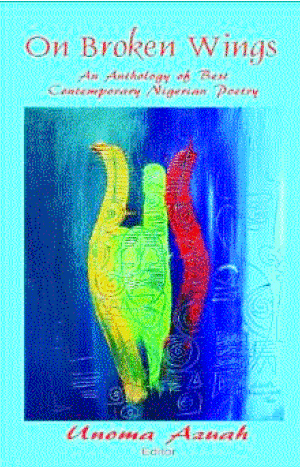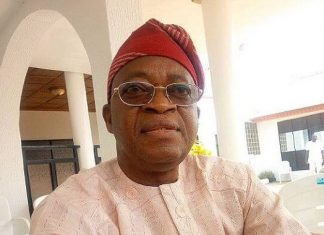Title of book: On Broken Wings
Author: Tunji Olalere
Editor – Unoma Azuah
Publisher – Dlite Press (2014)
Cover Design – Garden beneath Our Sea by Victor Ehikhamenor
Pages: 175
In On Broken Wings, attempts – to varied success – were made to break free from the generic presumptions of African poetry. The rustic and animist, though present, do not predominate.
What is a poet without the marinades of geography, politics and history? Most of the anthologised poets hearkened to Neruda’s law of life by referencing personal and national conflicts. It is safe to posit that this conflict and the attempt to achieve harmony, or a compromise, is the staple of true art. We must remember that poetry, like the soul, as contested by William Gass, in the umpteenth analysis, is contrived.
It is this contriving, this striking of iron until it roars red hot, that separate masters from pretenders. On Broken Wings, even to an un-tuned mind, is a joyful ride for the aficionado, a decent text for the willing student, and a peep-hole for the critic’s eye.
With 95 poems to the 72 poets, it is a panorama of contemporary Nigerian poetry; sublime pieces contrast drools, but when sublime, sublime they are – like when Tolu Ogunlesi muses:
Time drips
Without a bucket beneath,
Since nothing else
Remains to be squandered.
Squander it is, in reach and ethos, which permeates this anthology. It sprawls sometimes to the point of superfluity, over-reaching, over-embracing, as Africans are wont to – the smile stretched too far, or for too long.
To profligacy, on a metaphysical plane, On Broken Wings is: In memory of stars that blazed mid-sky, including those the Nigerian ‘road’ devoured: Lynn Chukwura, Ezenwa Ohaeto, Izzia Ahmad, Uche Mowah, Sesan Ajayi, Esiaba Iroibi, Ebere Onwu, Chukwu Eke, Ify Agwu (Omalicha), and Festus Iyayi.
This profligacy – the haemorrhage of life and lucre – turns the eye to distant places. And it threatens to confine our poetry to the combative, cathartic and redemptive. And the consequent defiance is implicit in every line of this anthology – like when in ‘Celluloid’, Dami Ajayi takes to task his childhood memory of the June 12 season:
Where is the Grandfather clock
With a stainless scrotum…?
Toni Kan’s ‘When Home No Longer Feels Like Home’, a mirage of pastures, would be the first of many, perhaps too many, poems of displacements. Strident yearns for yonder and forlorn longing for home dot this collection and perhaps more than anything else gives it its distinctive signature. Rendered with grace, Jumoke Verissimo’s ‘Drifting Home’ finds a young exile at a doorpost, unaware of the fictive world his memory had become. Ngozi Obasi Awa moans:
Doesn’t Annette in America
Turn the knobs of her tap…
Never uses her palms to see her walls at night?
This anthology is also a defiance of the unstated, though unequivocal, resolve of the Nigerian state to bury or revise our uncharted and often appalling national history. The Biafra hush, the June 12 snub and the abortion, in its place, that is the May 29 commemoration. It records, in moving cadences, the unspeakable horrors of the state-endorsed Odi massacre, the mob-murder of the Aluu four, and the mind-numbing tragedy of the Sosoliso air crash where Chiedu Ezeanah would in a moment of transcendental illumination surmise:
Song lures life on in disparate myths and tenor:
No end, there is none, the end of song is song.
Whatever the tyranny of our dreams, and the means to which we resort to survive the assault on them – mope or flee – Afam Akeh’s verdict on our suffering is instructive and final:
People look like rubbish
When they are no longer people.
This project is another watershed in the chronicle of our literature as a country – a nation exploring new platforms for our voices and realities. It gives seats to the competent, the promising, and the stutterers in a tent from which the pillars of Remi Raji, Tade Ipadeola, Ogaga Ifowodo and Chijioke Amu-Nnadi, can hope to find worthy replacements whenever they sag.
• Olalere is a medical doctor and poet. His fiction has appeared in Saraba magazine and elsewhere.













